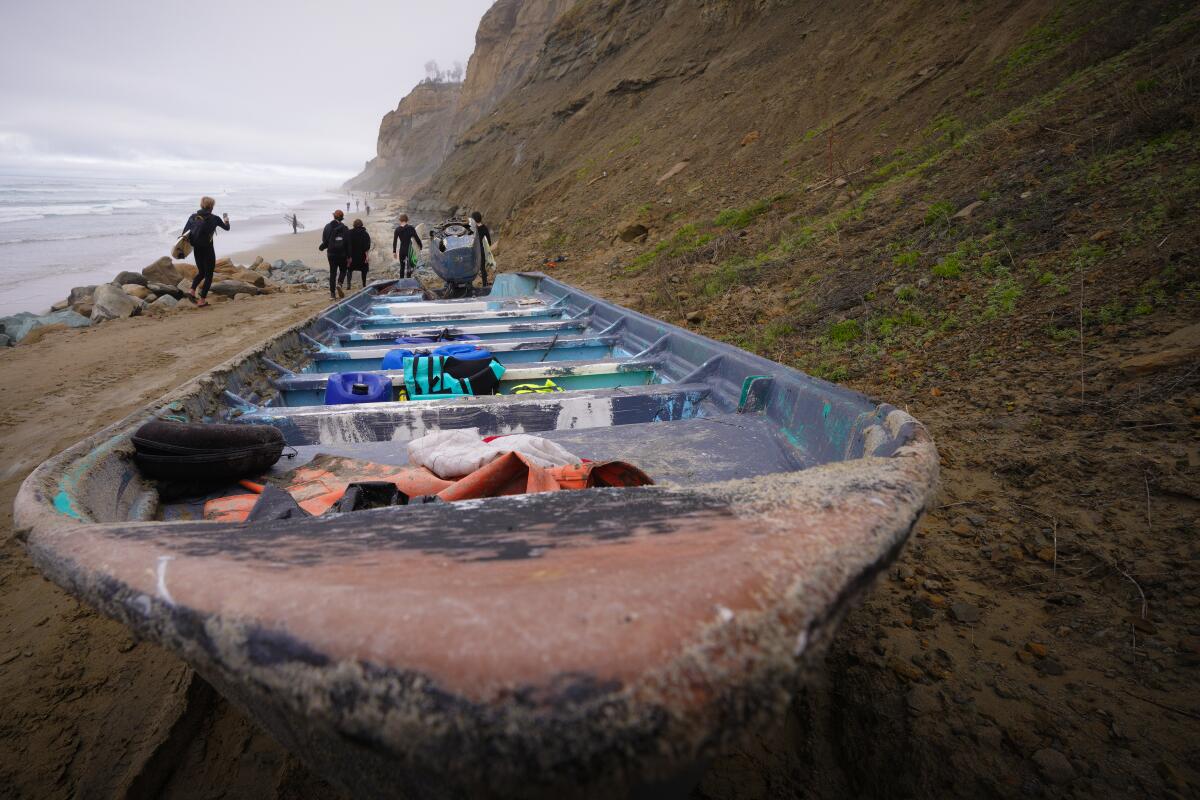7 of 8 victims in San Diego migrant boat disaster presumed to be Mexican, consulate says

- Share via
Seven of the eight people who died late Saturday night when two suspected human smuggling boats capsized near Black’s Beach in San Diego County are presumed to be citizens of Mexico, officials from the foreign consulate said Monday.
That presumption was “based on the identifications that some of them carried,” Alberto Lozano, a spokesperson for the Consulate General of Mexico in San Diego, wrote in a news release.
The nationality of the eighth person was unknown Monday. Personnel from the San Diego County medical examiner’s office will identify the victims.
San Diego lifeguards and U.S. Customs and Border Protection officers discovered the victims in the water and along the sand at Black’s Beach, at the foot of the bluffs a little south of the Torrey Pines Gliderport, after a woman called 911 around 11:30 p.m. Saturday. The woman, who spoke Spanish, told a dispatcher there were eight people on her boat and eight to 15 on a second boat, which had overturned.
When emergency crews arrived, they found two overturned boats, eight victims and no survivors, authorities said Sunday, adding that some people may have left before emergency personnel arrived. Several life jackets and fuel barrels had been abandoned along a roughly 400-yard stretch of sand.
Search-and-rescue efforts soon transformed into a search-and-recovery mission, though one hampered by thick fog that rendered helicopters useless.
Lifeguards from the San Diego Fire-Rescue Department searched the area until about 5 a.m. Sunday. Since then, lifeguards have been patrolling the site and surrounding areas, spokesperson Mónica Muñoz said.
The Coast Guard sent a helicopter to the site late Saturday, but the poor visibility caused them to quickly abandon the search. On Sunday morning, the agency sent a small boat, a cutter and a helicopter to help with the search but called off their resources about 4 p.m., according to Adam Stanton, a Coast Guard spokesperson.
With no other bodies found, authorities turned their attention to identifying the eight victims and investigating who was responsible for the deadly mishap.
Border Patrol officials say a maritime task force from Homeland Security Investigations, an agency under the umbrella of the Department of Homeland Security, is investigating the incident. A DHS spokesperson declined to comment on the investigation Monday.
A spokesperson from the county medical examiner’s office said there was no information available about the victims’ identities as of Monday but that autopsies were being performed. He said staff often worked closely with consulate officials from a victim’s country of origin.
“There is a reasonable assumption all are from another country,” Chuck Westerheide, a spokesperson for the medical examiner’s office, wrote in an email.
Westerheide said that, even if the victims had identification on them, it served “as more of a clue or guide” and was not enough to begin notifying family members. Fingerprints can help, though matching them with records from another country is “sometimes difficult,” Westerheide wrote. “Tattoos or other identifying marks” can also help investigators confirm someone’s identity.
Lozano, the Mexican consulate spokesperson, said that as soon as the medical examiner’s office confirmed the identities, consulate officials would notify the victims’ families.
“It’s unfortunate that we’re starting to get used to tragedies like this one,” Lilian Serrano, the director of the Southern Border Communities Coalition, said Monday.
Serrano and other representatives from organizations focused on U.S.-Mexico border relations say U.S. enforcement policies are the cause of such tragedies. “This is another example of how deterrence policies endanger lives,” Serrano said.
Federal authorities have repeatedly acknowledged that tight border security pushes migrants to more dangerous desert and ocean crossings but place the blame for deaths on “transnational criminal organizations” that lead such crossings.
“We urge people to enter the country legally and to not entrust their lives to a human smuggler,” Jason Givens, a Border Patrol spokesperson, wrote in a statement Monday. “Human smugglers treat people as a commodity. Their number one concern is how much they will be paid, not the welfare of the individuals.”
But Serrano said U.S. policies continued to cut off paths for people to reach the U.S. legally. She called the Biden administration’s asylum policy announced last month a near total asylum ban.
“Policy makers attempt to make crossing the border harder and sell the idea that it will stop migrants,” Serrano said. “But the reality is it has pushed people in desperate situations to cross through much more dangerous routes — either the desert, the ocean or climbing walls.”
Carlos González Gutiérrez, the consul general of Mexico in San Diego, thanked emergency crews for their efforts and offered a warning to migrants to avoid putting their lives at risk.
“People planning to cross the border into the United States, either by land or sea, should know that human smugglers will take advantage of their need in order to obtain illicit money, distorting reality, creating false expectations, and exposing them to high-risk conditions where they may lose their lives,” he said in a statement.
Lozano said those who believed relatives might be among the dead could call the consulate’s emergency line at (619) 843-6399 or contact the office at Proteccion@ConsulMexSD.org.
They can also contact the Center for Information and Attention to Mexicans — known as CIAM by its Spanish acronym — in the U.S. at (520) 623-7874.
More to Read
Sign up for Essential California
The most important California stories and recommendations in your inbox every morning.
You may occasionally receive promotional content from the Los Angeles Times.















